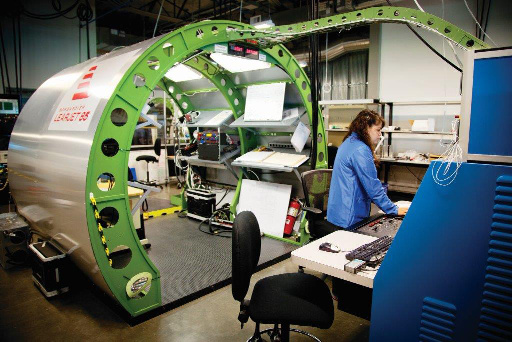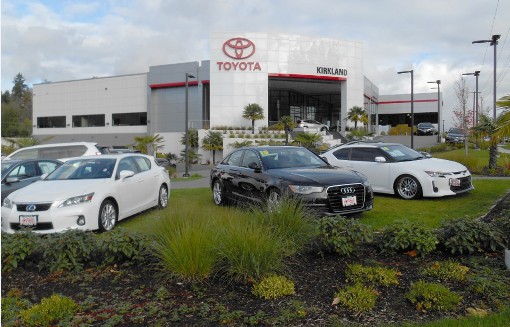5. Economic Development
This section provides policy direction regarding economic development in the Totem Lake Business District, and applies to land throughout the Business District and Urban Center. Broad Citywide economic development policies are found in the Economic Development Element. Those policies, while not repeated here, are applicable to the Totem Lake Business District.
The Totem Lake Business District is a vital employment, retail and service center that serves the City of Kirkland and surrounding region. The Totem Lake Business District is the City’s largest employment center and the City’s leader in retail sales. The business district contains the City’s only Urban Center, designated by the Growth Management Planning Council in 2003.
The policies in this section are intended to support and strengthen the economic environment in the Totem Lake Business District. A healthy economy provides employment and helps pay for basic public services such as parks, transportation, police and fire protection and human services. The policies encourage a mix of retail, office, service, residential and light industry/office uses, calling for intensive development where supported by public services, and collaboration between the public and private sectors.
Goal TL-3: Strengthen the role of the Totem Lake Business District as a community and regional center for retail, health care, vehicle sales, light industry and office employment.
Policy TL-3.1: Support the growth and retention of commercial activity in the business district.
The Totem Lake Business District is an economic engine for the City. The district has healthy retail and office areas as well as tremendous potential for growth. Public efforts should nurture and support existing uses as well as new growth. Public support can be provided through appropriate levels of public infrastructure (as defined in the Capital Facilities Element), a streamlined efficient regulatory review process, development standards that encourage high quality development, designation of sufficient land for commercial development and a variety of other mechanisms. All of these measures should be developed to support commercial activity in the business district.
Policy TL-3.2: Plan for economic activity that creates new jobs and increases the diversity of employment in the business district.
Land dedicated to economic development activities is a valuable resource that should be preserved and used as efficiently as possible. A complementary supply of retail, office and light industry/office land in the business district ensures diverse economic opportunities and will sustain future economic growth.
In addition, businesses that provide primary jobs (those that produce products or services sold outside of the community) should be encouraged. Primary jobs generally pay higher than average wages, stimulating consumer spending and increasing the opportunity for Kirkland’s workers to live within the community. These “basic industries” provide positive multiplier effects on the economy, through the sale of goods outside the region and by bringing new capital into the local economy.
Policy TL-3.3: Incorporate flexibility in regulations to encourage creative proposals consistent with Urban Center policies.
With the rate of innovation moving more and more quickly, it is important that policies not foreclose on opportunities that are not yet apparent. Many of the businesses in Totem Lake, particularly aerospace, medical device and interactive media, are part of regional business clusters that extend to neighboring communities. Consideration of the sustainability and growth of these larger business clusters should guide planning decisions in Totem Lake.
Policy TL-3.4: Limit uses that do not contribute to a dense and vibrant urban environment within the Urban Center.
Low density uses such as retail storage facilities occupy large amounts of land. These uses do not contribute to the dense, economically vibrant vision for Totem Lake and should be located outside of the Urban Center.
Policy TL-3.5: Strengthen the district’s light industry/office areas through supporting expansion of existing uses and welcoming redevelopment of these uses, while enabling them to evolve into innovative centers for commerce and employment.
Goal TL-4: Establish and support incentives to encourage automobile and other vehicle dealerships within appropriate areas of the business district.
Policy TL-4.1: Provide flexibility in development standards while maintaining an inviting visual environment.
Vehicle sales uses seek to maximize visibility and efficiency in the display and storage of inventory. Flexible development standards that assist vehicle dealers in these goals without compromising the visual character of the area should be considered in development standards and design guidelines for these uses. Where parking areas are located near gateways identified in this Plan, special attention to visual impacts is important. Parking areas should be appropriately landscaped so they do not detract from efforts to provide a welcoming and attractive entrance to the business district.

Policy TL-4.2: Assist existing and prospective vehicle dealers through a variety of means.
Because vehicle sales and service uses typically have unique spatial and visibility needs, these uses may require special assistance to ensure their continued viability in the City. Zoning and regulatory measures should be considered to remove obstacles to development and increase flexibility in development standards. When warranted by a clear public interest and benefit, the City should provide technical assistance in identification of sites or by facilitating business-to-business communication efforts.


